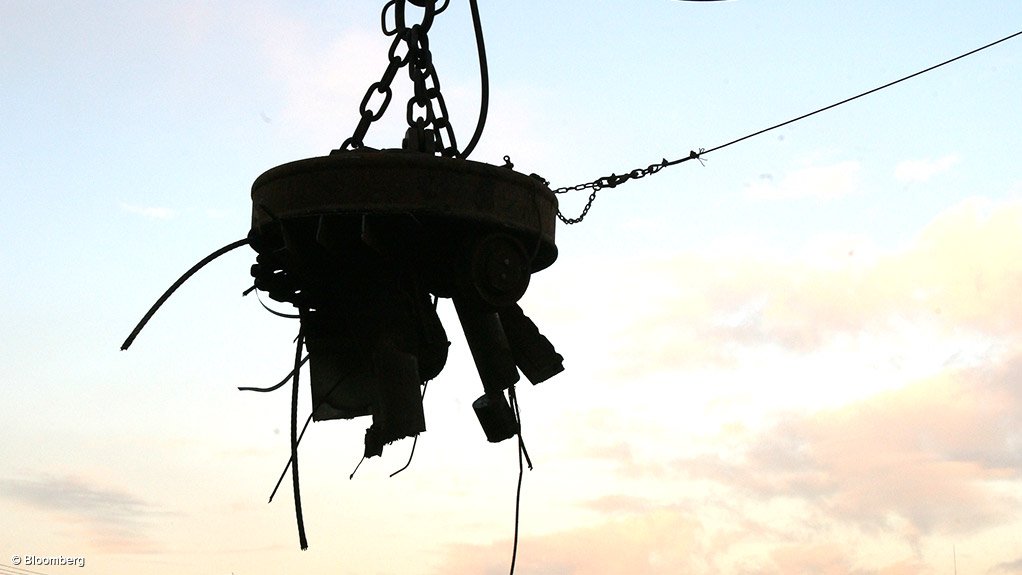Big scrap looms over proposed new scrap export rules
South African scrap merchants and domestic scrap consumers are taking strongly opposing positions regarding proposed amendments to the price preference system (PPS) policy guidelines, which will govern the future exportation of ferrous and nonferrous scrap metal.
The proposed changes were published by the International Trade Administration Commission of South Africa (Itac) in the Government Gazette of December 11 and are open for public comment until February 5.
The amendments seek to align the PPS with the Second-Hand Goods Act and government’s black economic empowerment policy, while also tightening up permit application and administration processes, right down to a stipulation of the times at which PPS-related transactions can be concluded.
In addition, Itac has included a clause specifying that all metal scrap be exported through a single harbour, with Port Elizabeth having been designated for the purpose.
PUNITIVE & ONEROUS
The Metal Recyclers Association (MRA), which has over 100 scrap-dealer members representing 70% of the market by volume, is objecting to the proposed changes, describing them as “punitive”. It has also written to Economic Development Minister Ebrahim Patel requesting an urgent meeting to canvass alternatives.
MRA chairperson Quintin Starkey tells Engineering News Online that the PPS has been progressively tightened since its introduction in 2013 and that the proposed changes will have serious unintended consequences.
They will result, he argues, in a further decline in scrap prices, which will place additional pressure on its members, through continued job losses and business closures.
The proposed changes will also jeopardise the livelihoods of tens of thousands of informal scrap-metal traders – the MRA estimates there to be 400 000 such traders, who support as many as 1.8-million dependants.
He says they are also inappropriate in the context of a yearly ferrous scrap surplus, which the MRA estimates at between 1-million and 1.5-million – the domestic industry collects about 3.5-million tons a year, of which the consuming industry only trades in 1.5-million tons.
The “onerous” requirement of insisting on all scrap being exported through Port Elizabeth would also add about R700/t to transport costs, which would be passed on to the generators of scrap in the form of lower prices.
The Road Freight Association (RFA) also objects to the designation of Port Elizabeth as the sole port of export, arguing that it could negatively affect the viability of hauliers.
Road freight operators, the RFA argues, are typically able to rely on a return leg from Durban when transporting scrap from the interior of the country. However, there is now a serious risk of the return trip from Port Elizabeth becoming a “dead leg”, which could result in some hauliers closing down.
However, Itac spokesperson Foster Mohale argues that a designated port has many benefits and will contribute towards the objectives of improving the administration of the system.
The proposed tightening of the PPS system – introduced primarily to improve domestic scrap availability and facilitate a 20% to 30% discount to export prices for local consumers – is broadly supported by scrap consuming industries, frustrated by the fact that the PPS is currently being bypassed by the scrap sector.
IN SUPPORT OF TIGHTENING
Non-Ferrous Metal Industries Association of South Africa chairperson Bob Stone tells Engineering News Online that the majority of its members are supportive of a further tightening of the PPS guidelines, as there are currently too many loopholes.
Government introduced the discounts and a restriction that scrap could not be exported before first being offered to domestic consumers in favour of introducing an export duty, or banning scrap exportation entirely; a measure that has been introduced in a number of other countries to shore up domestic supply.
But Stone says he has yet to come across a member firm that has successfully negotiated the discounts initially anticipated when the system was introduced.
Scaw Metals CEO Markus Hannemann adds that the proposed amendments should also be viewed in the context of the overall objectives of the PPS, which is to ensure the “steady supply of quality scrap material to local users at a price that is reasonable in order to support local industry”.
Hannemann argues that that objective is currently not being met and that the Itac intervention is designed to try walk a middle road between an outright ban and continuing to sustain an export channel that is aligned to the beneficiation goal.
Scaw, therefore, supports the proposed changes and also believes that the steel and engineering sector will benefit from the new policy, by securing current jobs and levelling a playing field currently made uneven by the large scale export of quality scrap.
Starkey acknowledges that the PPS is not working as envisaged, but also questions whether it is the best instrument for meeting government’s aims.
CONSULTATION NEEDED?
“Our appeal to government is to have a proper roundtable consultation with all industry stakeholders on the proposed amendments and the PPS system in its entirety,” he says, stressing that the MRA is keen to be part of a “constructive” solution.
“We need a platform through which to engage government and other industries to find a solution to the problem.”
Steel and Engineering Industries Federation of Southern Africa (Seifsa) chief economist Henk Langenhoven says further dialogue is probably necessary, as the proposals outlined in the Gazette do appear onerous. He also cautions that there are often negative outcomes even when new regulations are well intentioned.
He says Seifsa remains concerned about the availability and pricing of scrap, which is affecting the competitiveness of domestic industry.
“This is an attempt to plug the holes and stop the circumvention of the initial guidelines,” Langenhoven explains. “My worry, as an economist, is that the new rules are so onerous that it might stop international trade completely.”
Others are dubious about whether further dialogue will yield a solution, particularly in the context of a material trust deficit that has developed, largely as a result of what is perceived to be the scrap industry’s ongoing circumvention of the PPS.
“Discussions on this issue have been ongoing since around 1998. The conclusion in most of those meetings is that industry needs assistance –we are becoming uncompetitive, we are closing, we are losing jobs,” Stone says.
“So we can go on talking for another 10 or 15 years, but by then the industry, which is already only half of what it was, will be no longer . . . and we will become totally deindustrialised.”
Itac’s Mohale confirms that the reason for the proposed amendments is to improve compliance and enforcement. “Improved, effective administration will support the objectives of the PPS to provide the necessary input material which will ensure internationally competitive beneficiation of scrap metals by the local consuming industry,” he says.
Mohale says the notice forms part of the consultation process and stresses that all comments will be “duly considered”.
“Should a need for further information arise, relevant parties will be approached. The recommendations will be submitted to the Itac for consideration after which the amendments will be published.”
Comments
Press Office
Announcements
What's On
Subscribe to improve your user experience...
Option 1 (equivalent of R125 a month):
Receive a weekly copy of Creamer Media's Engineering News & Mining Weekly magazine
(print copy for those in South Africa and e-magazine for those outside of South Africa)
Receive daily email newsletters
Access to full search results
Access archive of magazine back copies
Access to Projects in Progress
Access to ONE Research Report of your choice in PDF format
Option 2 (equivalent of R375 a month):
All benefits from Option 1
PLUS
Access to Creamer Media's Research Channel Africa for ALL Research Reports, in PDF format, on various industrial and mining sectors
including Electricity; Water; Energy Transition; Hydrogen; Roads, Rail and Ports; Coal; Gold; Platinum; Battery Metals; etc.
Already a subscriber?
Forgotten your password?
Receive weekly copy of Creamer Media's Engineering News & Mining Weekly magazine (print copy for those in South Africa and e-magazine for those outside of South Africa)
➕
Recieve daily email newsletters
➕
Access to full search results
➕
Access archive of magazine back copies
➕
Access to Projects in Progress
➕
Access to ONE Research Report of your choice in PDF format
RESEARCH CHANNEL AFRICA
R4500 (equivalent of R375 a month)
SUBSCRIBEAll benefits from Option 1
➕
Access to Creamer Media's Research Channel Africa for ALL Research Reports on various industrial and mining sectors, in PDF format, including on:
Electricity
➕
Water
➕
Energy Transition
➕
Hydrogen
➕
Roads, Rail and Ports
➕
Coal
➕
Gold
➕
Platinum
➕
Battery Metals
➕
etc.
Receive all benefits from Option 1 or Option 2 delivered to numerous people at your company
➕
Multiple User names and Passwords for simultaneous log-ins
➕
Intranet integration access to all in your organisation





















